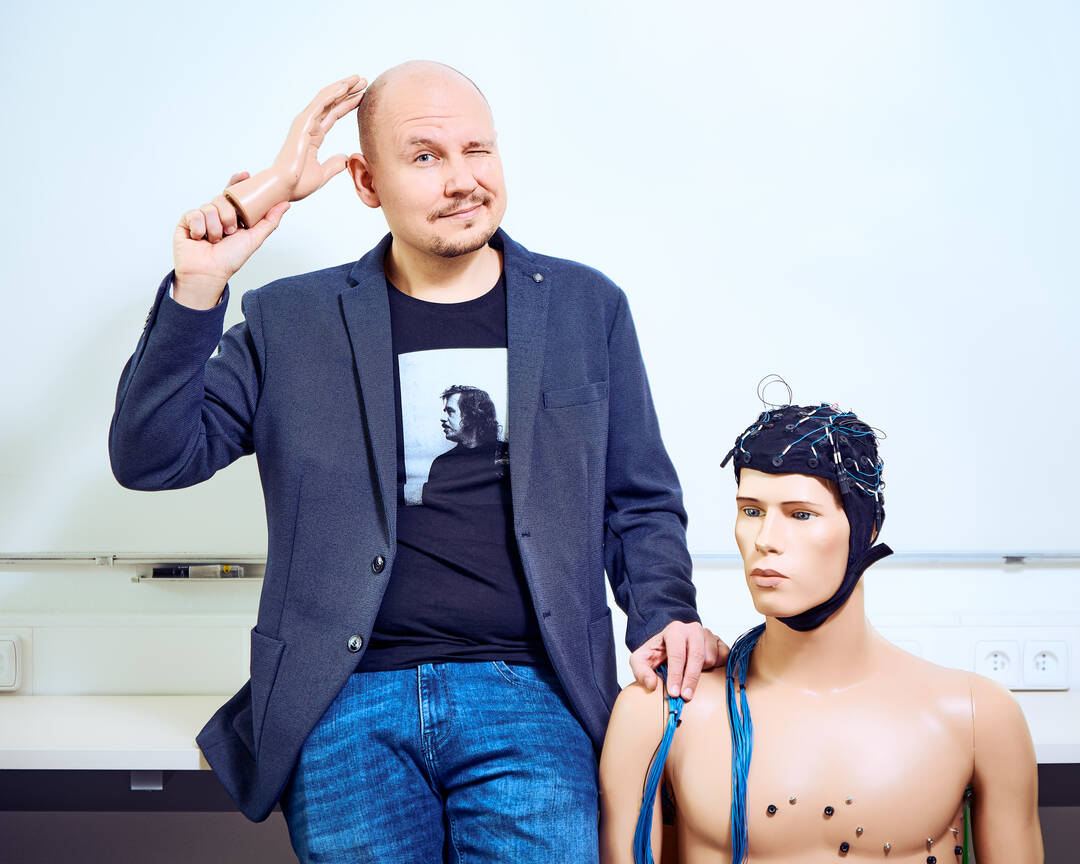"Over the past 25 years, we have seen tremendous advances in epilepsy treatment options. Thanks to interdisciplinary cooperation and modern technologies, we are able to help an ever wider range of paediatric patients, including those for whom no effective treatment existed until recently," said Prof. Pavel Kršek, M.D., Ph.D., Head of the Department of Paediatric Neurology at the 2nd Faculty of Medicine of Charles University and Motol University Hospital and guarantor of the paediatric epilepsy surgery programme.
"As representatives of technical disciplines, we prepare a wide range of documents for doctors, such as brain imaging and other analyses. And based on these, medical teams decide where to operate on the patient," said Dr. Radek Janča from the Department of Circuit Theory at the Faculty of Electrical Engineering of the Czech Technical University.
Epilepto-surgery allows not only to eliminate seizures, but also to improve the cognitive development and overall quality of life of children and their families. "We no longer evaluate the success of the operation only by whether it succeeds in stopping seizures. Our goal is also to minimize the need for medication, improve the child's psychomotor development and support their integration into normal life," says Martin Kudr, M.D., Ph.D., head of the pediatric epilepsy surgery program.
Interdisciplinary cooperation and innovation
The epileptosurgery programme at Motol Hospital benefits from close cooperation between neurologists, neurosurgeons, geneticists and neuroimaging specialists. The Epileptology Research Centre (EpiReC) also plays a key role, which has enabled the introduction of innovative diagnostic and treatment procedures.
In addition to Dr. Radek Janca, the EpiReC project involves Prof. Roman Čmejla, Dr. Petr Ježdík, Ing. Kateřina Macková and Ing. Jakub Vybulka. All of them work at the Department of Circuit Theory. One of the tasks of this team is to design, improve and combine algorithms that can process signals and then extract biomarkers from large amounts of data using machine learning. These can then be used to select the most effective treatment for a given patient. You can read more about the work of the FELU scientists within EpiReC HERE.
"Thanks to modern methods such as invasive monitoring from intracranial electrodes and advanced genetic analyses, we can more accurately determine which patients have the best chance of successful surgery," explains Assoc. MUDr. Barbora Straka, Ph.D., an expert in neurogenetics.
"Today's surgeries are not only more effective, but also significantly safer. Thanks to advanced technologies and the experience of our team, we are able to minimize risks and achieve excellent results," adds doc. MUDr. Petr Libý, Ph.D., neurosurgeon.
Patient Stories
One patient whose story illustrates the crucial importance of epilepsy surgery is two-year-old Elena, who was operated on as a newborn in 2023 for extremely severe epilepsy (Ohtahara syndrome). Today, Elenka is seizure-free, medication-free and her development is much better than we ever hoped for," says her mother.
Another inspiring story is that of Maja, who underwent surgery at the age of six due to frequent daily seizures. Now, at nine years old, she functions as a completely healthy child with many interests. "Thanks to a quick diagnosis and surgery in Motol, Maja did not have to experience the limitations associated with epilepsy for a long time. We are very happy that she can live a normal life," says her father.
The future of epilepsy surgery: emphasis on early diagnosis
One of the key messages of the press conference was the need for early diagnosis and prompt indication for surgery. "The sooner we operate on a child, the better chance we give them to live a full life. In some cases, we can even prevent the development of drug-resistant epilepsy with surgery," says Professor Kršek. The epilepsy surgery at Motol is not only for Czech children, but also helps patients from Slovakia and other European countries. This is confirmed by the story of 17-year-old Michael, a Slovak patient who was operated on in 2023 thanks to the innovations introduced within the EpiReC centre.
"Without this surgery, my life would be very different. Now I am completely healthy and can pursue my dreams," says Michael. Children's epilepsy surgery in Motol has thus become not only a Czech but also an international centre of excellence. The press conference provided an opportunity for experts, patients and journalists to discuss the importance of this specialisation and the future perspectives for the treatment of childhood epilepsy. After the press conference, the participants had the opportunity to see the premises of the Department of Paediatric Neurology, where the diagnosis and treatment of paediatric patients takes place. Motol University Hospital is the largest medical facility in the Czech Republic and one of the largest in Europe. It is also the main teaching base for students of the 2nd Faculty of Medicine of the Charles University and also houses some departments of the 1st Faculty of Medicine of the Charles University. Motol Hospital provides basic, specialised and superspecialised healthcare and services in medical fields in the form of outpatient and inpatient care for children, adults and the elderly. It is structurally composed of two interconnected monoblocks (children's and adult parts) and several separate pavilions. More than one million patients are treated annually in 56 clinics at the Motol University Hospital.


